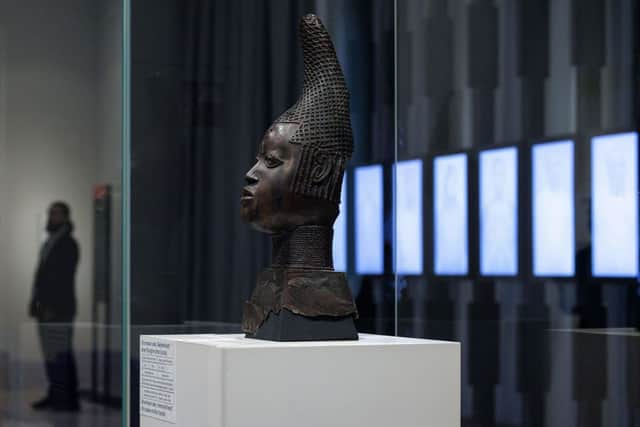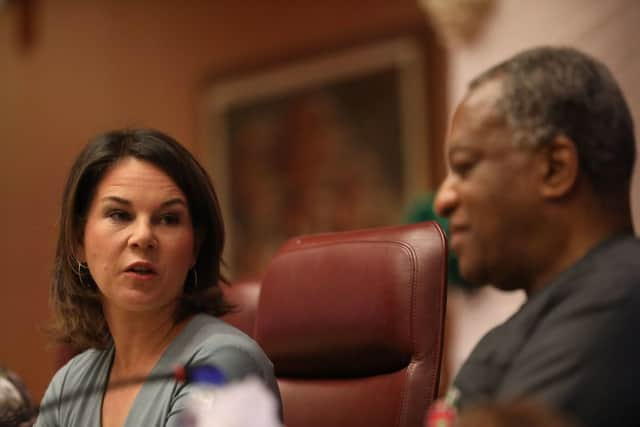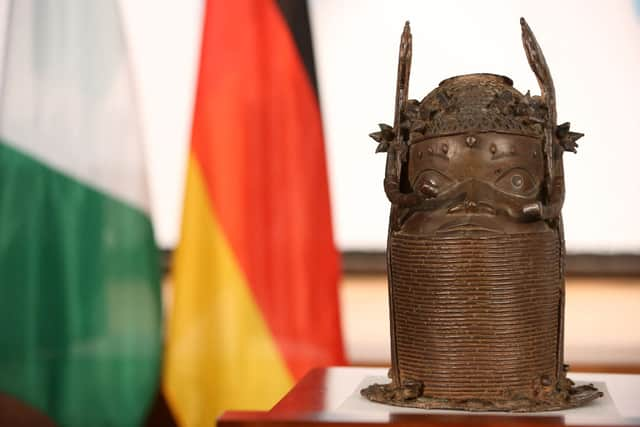What are the Benin Bronzes? Why Germany returned artefacts to Nigeria - are some still at British Museum?
and live on Freeview channel 276
A series of Benin Bronzes have been returned to Nigeria by Germany, after they were stolen by the British Empire 125 years ago.
The historical artefacts, some of which are believed to have been created almost 500 years ago, originate from Benin City - a major Nigerian city some 400km south of the country’s capital Abuja. They are not to be confused with the modern day West African country of Benin on Nigeria’s western border.
Advertisement
Hide AdAdvertisement
Hide AdThe return of some of the Bronzes has increased the pressure on the UK government and British Museum to give back its own collection of the artefacts.
It comes as the country and one of its most iconic museums faces calls from Greece to return the Elgin Marbles. This week, the Vatican returned a section of the ancient statues held in its collections at the order of Pope Francis.
But what exactly are the Benin Bronzes - and will the British Museum follow Germany’s lead in returning them? Here’s what you need to know.


What are the Benin Bronzes?
The Benin Bronzes are a series of sculptures, including elaborate decorated plaques, human figures and jewellery. They are famed not only for their stunning craftsmanship, but also for being a historical record of the Kingdom of Benin - a part of the modern day state of Nigeria.
Advertisement
Hide AdAdvertisement
Hide AdSome parts of the collection recount the Kingdom’s first contacts with Europeans, while others document the social and political history of southern Nigeria.
They were cast in Benin City, which was a powerful city state from the Medieval period until it was conquered by the British Empire in 1897. It is believed the oldest parts of the collection were created in the 1500s - although they could date from even earlier.
As well as metalworks, the Benin Bronzes collection is also made of historic objects made from ivory, leather, coral and wood.


The Bronzes came to be in the UK and Germany’s possession after the sacking of Benin City by the British Empire in 1897. 900 objects remain in the British Museum in London, with thousands of other artefacts held by countries including the USA and the Netherlands, as well as by private collectors.
Why did Germany return Benin Bronzes to Nigeria?
Advertisement
Hide AdAdvertisement
Hide AdOn Tuesday (20 December), Nigeria announced it had received some of the most prominent Benin Bronzes that had been in Germany’s possession.
In all, the West African country’s foreign ministry displayed 21 artefacts that had been returned, including a miniature mask of the ‘Iyoba’ (which means queen mother) and a throne depicting a python.
It comes after the German federal government signed a declaration earlier in 2022 that saw it pledge to return all of the 1,130 Benin Bronzes in its possession to Nigeria. On 1 July, these artefacts began the journey from Germany’s public museums to the country.
Speaking in Abuja at the official handover ceremony, Germany’s foreign minister Annalena Baerbock said: “What would it mean for us to be deprived of our cultural heritage?
Advertisement
Hide AdAdvertisement
Hide Ad“To not be able to marvel at the Gutenberg Bible in Mainz? To be unable to admire Martin Luther’s writings? To stand in front of a sculpture by Käthe Kollwitz in Berlin or at Goethe’s desk in Weimar? It evokes a sense of loss I can hardly imagine. To you here in Nigeria, however, this loss has been your reality.”
Will the British Museum return the Benin Bronzes?
Germany’s move has heaped pressure on the UK government and British Museum to hand back its major collection of Benin Bronzes. Speaking at the handover ceremony in Nigeria’s capital Abuja, the country’s culture minister Lai Mohammed told reporters: “The British Museum must understand that repatriation is a turn whose time has come.”


He also revealed he had “met a brick wall” when trying to broach the issue with the UK government in light of Germany’s actions.
The British Museum has said it is “committed to active engagement” with Nigeria institutions about the future of the Benin Bronzes. It says it is engaged in “full participation” with the Benin Dialogue Group - a group that includes other European states and aims to establish new museums in Benin City that can host permanent displays of the Kingdom of Benin’s historic objects.
Advertisement
Hide AdAdvertisement
Hide AdIn 2018, the museum’s director Hartwig Fischer held talks with Nigerian museum directors to discuss sharing and displaying culturally significant historical objects, like the Bronzes. Despite facing calls for the Benin Bronzes to be returned during these negotiations, Mr Fischer argued that they serve as “cultural ambassadors” for Benin when they are displayed internationally.
Comment Guidelines
National World encourages reader discussion on our stories. User feedback, insights and back-and-forth exchanges add a rich layer of context to reporting. Please review our Community Guidelines before commenting.
